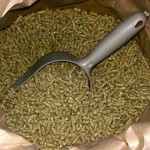Reading Time: < 1 minute Look at the facts before buying feed supplements, says a provincial beef and forage specialist. “After talking to various retailers, one comment comes out loud and clear,” said Barry Yaremcio of the Ag-Info Centre in Stettler. “Sales of lick tubs, molasses blocks, mineral products, and protein supplements are way up from previous years. But are […] Read more

Know your feed before buying supplements
If feed quality, amounts, and animal weights aren’t known, you can’t tell if supplements are required, says specialist

Top tips for feeding for rumen health
Cattle — and microbes in their rumens — need a consistent supply of both dry matter and nutrients to improve performance and reduce digestive diseases
Reading Time: 3 minutes Cattle feeders aren’t just feeding cattle — they’re also feeding the microbes that live in the rumen. And those little critters are picky. “Regardless of the production system, the challenge that we face is variation in dry matter intake and total nutrient intake,” said Greg Penner, assistant professor of animal and poultry science at the […] Read more

Poor hay causing concern
Reading Time: < 1 minute Up to one-half of Alberta hay supplies may be of lower quality, says a provincial beef and forage specialist. “Protein levels in a lot of hay that was cut late or damaged by rain over the summer, is testing 25 to 30 per cent lower than normal,” said Barry Yaremcio, noting that skinny cows have […] Read more

Myth busted: Properly processed feed wheat won’t cause digestive upset
Researchers in Lethbridge swapped wheat for barley in a cattle ration without any negative effects — but the wheat must be properly processed
Reading Time: 3 minutes Shrinking barley acres have cattle producers on the hunt for a low-cost feed option. And feed wheat could be the answer — as long as the wheat is processed properly. “There was a feeling out there that you probably couldn’t feed more than 50 per cent wheat in the diet because wheat is quite rapidly […] Read more

